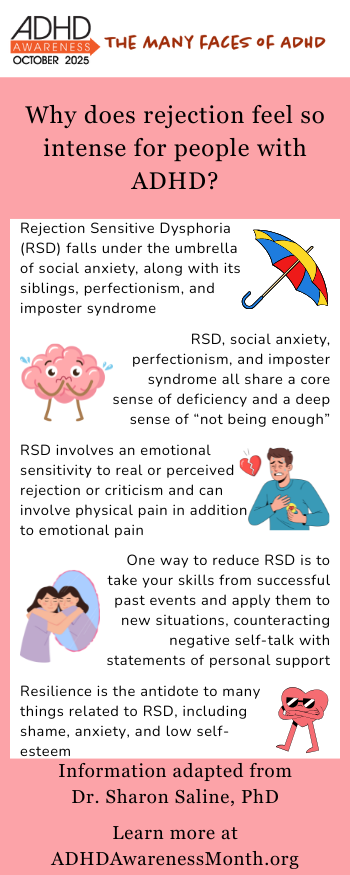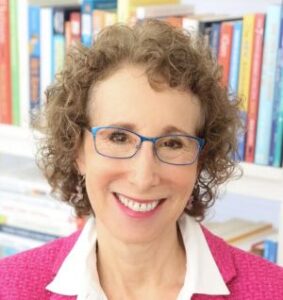Dr. Sharon Saline explores Rejection Sensitive Dysphoria (RSD)—a powerful emotional response to real or perceived rejection or criticism. It relates to social anxiety, perfectionism, and imposter syndrome, all of which share a deep sense of “not being enough.”
Transcription follows this 11 minute video
Have trouble understanding or hearing?
Click the Subtitles/Closed Caption icon at the bottom right while watching the video.
Attention Matters

Hello again, and welcome back to Attention Matters, a podcast from the ADHD Awareness Coalition, where we break down the facts about ADHD and what they mean for real life.
In this episode, we’re joined by Dr. Sharon Saline, PsyD, a clinical psychologist and a popular author and speaker with more than 30 years of working with individuals and families affected by ADHD.
Her work emphasizes not fixing neurodivergent brains, but helping people reduce stress, strengthen emotional resilience, and navigate life with confidence.
Dr. Saline has worked with many people coming to their own terms with rejection sensitivity dysphoria. Today, she’s here to explain what RSD is and what someone can do to handle the symptoms and make positive changes in their lives.
Dr. Sharon Saline
Hello, I’m Dr. Sharon Saline, and I’m here to talk about understanding rejection-sensitive dysphoria in adults with ADHD.
Now, we can’t really discuss RSD without zooming out to look at social anxiety in general. We humans are wired for connection, and our needs make us vulnerable.
RSD really falls under the umbrella of social anxiety, along with its siblings, perfectionism and imposter syndrome. All of these conditions share a core sense of deficiency, a belief that you are not enough, that you can easily fail or be excluded because of being different.
Perhaps you think you’re neurodivergent and therefore you don’t deserve positive accolades. Maybe you’ve experienced years of receiving criticism that leads to this core sense of deficiency. Social anxiety is an intense fear in advance of an event or situation, which could be embarrassing, but you’re expecting judgment and humiliation of some kind. And there’s a fundamental disconnect between how you might appear to others and your own often exaggerated and negative perceptions of yourself. You think you know what other people think about you, which is really not necessarily the case.
Now, RSD falls under the umbrella of social anxiety because it takes these worries to the next level. RSD involves an emotional sensitivity to rejection or criticism, whether it’s real or perceived.
Rejection-sensitive dysphoria, unlike social anxiety, isn’t a formal diagnostic category, but it’s a syndrome that was named by Dr. William Dodson after years of observing traits and behaviors in his patients with RSD. And RSD is much more than disliking rejection. There’s a kind of physical experience of it as well as an emotional experience. Often people who experience RSD have these overwhelming feelings that are almost too much to bear, and it can cause emotional pain with actually some physical pain that’s associated, even when no actual rejection has taken place.
It’s very hard for people with RSD to let go of past hurts, and it’s harder to bounce back. They feel like they’re sort of living in a one-down position.
And for me, I find, as I have RSD, that it’s hard to recover when I’m rejected or if I hear personal criticism, ’cause I can replay these unpleasant interactions over and over. There can be intense mood shifts and mood changes that come from clear triggers versus mood disorders which aren’t necessarily related to clear triggers and it’s important to know the difference.
Rejection sensitive dysphoria often shows up as a difficulty of letting go of past hurts, intense feelings based on the belief that you’ve let other people or yourself down, heightened emotional sensitivity, intense mood shifts, and in strong shame related to any missteps or mistakes.
And there are various components of RSD. Anxious expectations. Worry about rejection can lead to looking for signs of disapproval. Misinterpretations. Maybe you interpret an ambiguous social cue as a clear indicator of rejection.
Strong emotions reacting with intense feelings of anger, sadness, fear, or shame about rejection and sometimes unhelpful behaviors, acting in ways that avoid any chances of rejection. So you’re withdrawing, or maybe you are trying to provoke the rejection so you’re in control of it, so you’re increasing its likelihood.
There’s a difference between highly sensitive people, HSP and RSD.
HSP is a personality trait characterized by heightened sensitivity to sensory stimuli. RSD has to do with emotional sensitivity to rejection. That’s in response to and related to ADHD and neurodivergence.
Now, what are some strategies for reducing RSD?
Well, first, we want to take our skills from successful past events and apply them to new situations. It helps if you can see yourself as someone who’s capable and making and keeping friends by doing this one person at a time. Although I do think three friends is the best way to go, as a minimum, because you can find someone to be with when somebody is not available.
Acknowledging your vulnerabilities as areas for improvement, not personal failings. Treating yourself with the same kindness and compassion you treat others. Describing and investigating your fears with your Sherlock Holmes hat on instead of judging them and noticing your effort as much as the outcome.
Worry says to you, fear says to you, blah, blah, blah, and you can’t handle it. But your past successes show you that actually you can. You can counteract that negative self-talk with statements of personal support, like, I can make a mistake and still be a good person.
I’m worthy of kindness, friends, and belonging. It’s not all my fault. It takes two to tango.
Try writing down a few positive self-talk phrases on your phone that you can check out when you’re feeling stuck in a situation. Focus on what lights you up. This will counteract that, that sense of deficiency.
When you’re doing things that you love, when you’re doing things that you feel good about, you, you, you really put money in the bank of self-esteem rather than constantly taking out deposits. Well, actually, you don’t take out a deposit by making withdrawals about what’s wrong with you and what you should do differently.
And the last tip that I want to give you is one of my favorites.
It’s called quit taking it personally, Q-tip.
And this means to consider the source of who is saying something to you. So, what is it about you and what is it about them?
Mel Robbins talks a lot about the let them theory. Well, in, in this case, for people with RSD, it’s important to know what is your area and what is theirs, because sometimes we take on things that aren’t ours and act as if they’re our fault. And it’s important in those moments to zoom out and get a bigger picture.
Run something by a friend or a colleague, a family member, a therapist, or a coach if you’re unsure, or if you think you might be overreacting. Zoom out before you come to any conclusions.
And lastly, I really want to remind you that resilience is really the antidote to so many things related to RSD, including shame and anxiety and low self-esteem.
When you feel like you can bounce back from things, when you feel like you can use a growth mindset to hear something, take it in, pivot accordingly, but not necessarily experience it as character assassination, you’re moving beyond rejection sensitivity to a more of a neutral response. And that neutral response will assist you in your daily life with other people at home, at school, at work, socially, pretty much anywhere.
So, thank you so much for joining me for this little talk on understanding rejection-sensitive dysphoria in adults with ADHD. My name is Dr. Sharon Saline. You can find me on my website, www.drsharonsaline.com, where there’s a whole host of resources for you about topics like RSD and much more.
Thank you so much.
Attention Matters
Thank you for joining us on Attention Matters, a podcast from the ADHD Awareness Coalition.
A very special thank you to Dr. Sharon Saline for agreeing to join us. Dr. Saline is a great friend of the ADHD Awareness Coalition. She will be at the 2025 International Conference on ADHD, TheADHDConference.org, this November as one of our many presenters. So, if you’re at conference this year, you might want to catch her presentation.
The ADHD Awareness Coalition is comprised of the ACO, ADHD Coaches Organization, CHADD (Children and Adults with ADHD), and ADDA, the Attention Deficit Disorder Association, who are all sponsors of the Annual International Conference on ADHD.
For reliable information and resources, visit ADHDAwarenessMonth.org and our member organizations.
And share this episode to help raise awareness! It is also available on Spotify and TikTok
About the Speaker

Dr. Sharon Saline, PsyD– Clinical Psychologist, Author of What Your ADHD Child Wishes You Knew
Sharon Saline, Psy.D., clinical psychologist and author of the award-winning book, What Your ADHD Child Wishes You Knew: Working Together to Empower Kids for Success in School and Life and The ADHD solution card deck specializes in working with kids, young adults and families living with ADHD, learning disabilities and mental health issues. Learn more at www.drsharonsaline.com.
